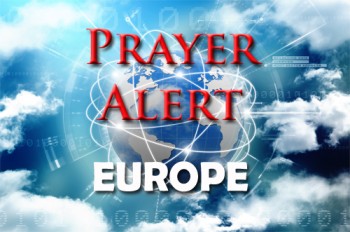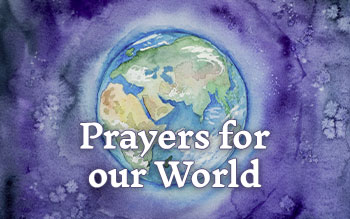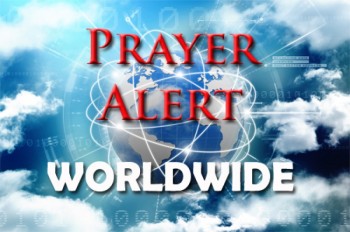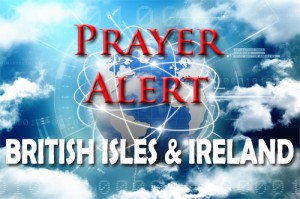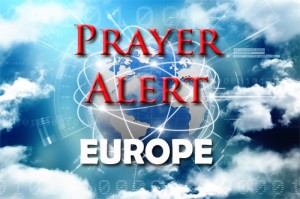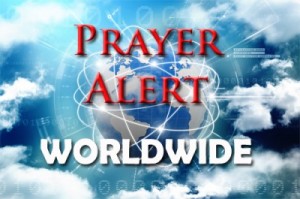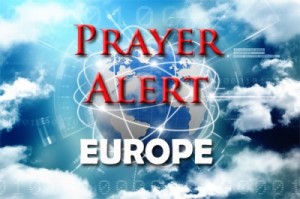Displaying items by tag: UK
EU / UK trade
We can be thankful that trade between the UK and EU partially recovered in February, after a steep drop following Brexit. However, exports were still below last year's levels and imports from the EU had seen a weaker recovery. Figures show the UK economy grew by 0.4% in February, but the economy was still 7.8% smaller than a year earlier, before the impact of the pandemic. The Federation of Small Businesses said overall sales had dropped by £2.5bn, and its members needed more help. Chairman Mike Cherry said: ‘UK exports have tumbled since the end of the Brexit transition period. International sales are way down on where they were at this time last year. A fifth of small exporters have halted sales to the EU temporarily, and some have already given up on selling into the bloc on a permanent basis.’
Nigeria: 'Incessant killing more dangerous than Coronavirus'
Report on Nigeria to UK Parliament
“The incessant killing is more dangerous than Coronavirus” …The words of a community leader in central Nigeria – after coronavirus had reached his country – after an April attack in which nine people died, including a pregnant woman and her three year old.
His reaction is one of several testimonies – frequently harrowing to read, let alone to have experienced – that feature in an Inquiry into the scale of death and destruction caused by conflict occurring along the Christian-Muslim faultline running across the ‘Middle Belt’ of Nigeria, Africa’s most populous nation.
The Inquiry is published today, 15 June, by the All Party Parliamentary Group (APPG) for International Freedom of Religion or Belief of the UK Parliament; it has been taking evidence since autumn 2018.
(However, since the Coronavirus pandemic, violence appears to have grown even as international media have been otherwise occupied).
“APPG members have been alarmed by the dramatic and escalating violence in Nigeria characterised as the farmer-herder conflict. This violence has manifested along ideological lines, as the herders are predominantly ethnic Fulani Muslims and the farmers are predominantly Christians. There has been significant debate about what factors are driving and exacerbating this crisis. Therefore, the APPG launched a parliamentary inquiry to help develop a nuanced understanding of the drivers of violence”.
The resulting report ‘Nigeria: Unfolding Genocide?’ points out that the violence has claimed the lives of thousands of people and displaced hundreds of thousands more. It has caused untold human and economic devastation and heightened existing ethno-religious tensions. “The [age old farmer-herder] conflict has evolved from spontaneous reactions to provocations and now to deadlier planned attacks” it quotes the International Crisis Group as saying.
Despite the scale of the violence, the conflict is much less well known internationally than the 10 year long Boko Haram insurgency which has claimed over 30,000 lives (112 Chibok girls are still ‘missing’ after 6 years) and now its offshoot Islamic State West African Province’s (ISWAP) atrocities. These also feature in the APPG report and appear to have escalated in recent weeks and months. (In the latest Boko Haram-linked incidents this past week, over a hundred have died and hundreds more been injured; a UN humanitarian hub and a police station were reported burned down).
However, this APPG report echoes the Global Terrorist Index (GTI) 2019 by the Institute for Economics and Peace, which indicates that the primary driver of the increase in violence in sub-Saharan Africa is a rise in activity in Nigeria attributed, not to Boko Haram, ISWAP or Ansar ul Islam, but to Fulani militant extremists. In 2018, it appears Fulani extremists were responsible for the majority of terror-related deaths in Nigeria.
Its geographical footprint is also larger, with conflict manifesting in more States.[1] According to global NGO, Search for Common Ground (SfCG), “between 1 January 2019 and 1 January 2020, inter-communal violence represented the most severe threat to civilian lives in Nigeria.”[2]
In his report for the UK’s Foreign and Commonwealth Office a year ago, the Bishop of Truro concluded “the religious dimension is a significantly exacerbating factor” in clashes between farmers and herders and “targeted violence against Christian communities in the context of worship suggests that religion plays a key part.”[3]
The Nigerian Government’s attempts to resolve the ethno-religious conflict have been ineffective; there seems to be no end in sight. The long-term consequences of failure to reduce the violence are severe, says the Inquiry: “There is the enormous cost in terms of human lives but there is also the potential for economic collapse, famine, further mass displacement of civilians and even more conflict, as the two major religious groups in the country become increasingly polarised”.
Pray: that the perpetrators of these atrocities will be brought to justice.
Pray: for the victims and families of these terrorist attacks.
Pray: for a breakthrough in the efforts of the Nigerian government to broker lasting peace in the region.
Pray: that the world community will come together to bring about pressure on the Nigerian politicians to deal with the situation at all levels.
Pray: against the powers of darkness that they will be overcome IJN.
Hong Kong 'seeking arrest' of fleeing activists
Police in Hong Kong are seeking the arrest of six pro-democracy activists living in exile in Western countries, including the UK, media reports say. The group reportedly includes former UK consulate worker Simon Cheng, well-known activist Nathan Law and US citizen Samuel Chu. They are wanted on suspicion of violating a new security law imposed in Hong Kong by Beijing, Chinese state TV reported, calling them "troublemakers". Hong Kong police declined to comment.
The development comes after legislative elections scheduled for September were delayed for a year by Hong Kong's government on Friday. It said the move was necessary because of a spike in Covid-19 infections, but the opposition accused it of using the pandemic as a pretext. The White House said the move undermined democracy.
Pro-democracy politicians had hoped to capitalise on anger in the Chinese territory about the new security law to win a majority in the Legislative Council (LegCo). Many in Hong Kong, a former British colony handed back to China in 1997, fear that unique freedoms meant to be guaranteed until 2047 are under serious threat.
The UK and Australia are among countries that have suspended their extradition treaties with Hong Kong in recent weeks. Germany did so on Friday - one of those reported to be on the new "wanted list" has received asylum there.
Who are the 'wanted'?
Chinese state TV network CCTV said six people were wanted on suspicion of inciting secession or colluding with foreign forces - both crimes can be punished with up to life in prison under the new security law.
The six, according to CCTV and Hong Kong media, are:
Simon Cheng, a former employee of the UK's Hong Kong consulate who was recently granted political asylum in Britain. Nathan Law, 27, a high-profile activist who has fled to the UK.
The Hong Kong residents ready to leave for the UK…
Samuel Chu, a US citizen. He is the son of Reverend Chu Yiu Ming, a Baptist minister who was one of the founders of the 2014 "Umbrella Movement". Mr Chu runs the Washington DC-based Hong Kong Democracy Council and said he last visited Hong Kong in November 2019. "I might be the first non-Chinese citizen to be targeted, but I will not be the last. If I am targeted, any American and any citizen of any nation who speaks out for Hong Kong can, and will be, too," he said.
The national security law carries extraterritorial provisions that say anyone, including non-Hong Kong residents, can be charged under it. China says the law is necessary to restore stability and order in the global financial hub.
Ray Wong, a pro-independence activist who fled to Germany in 2017 and is now in Britain, told the BBC that the list of "wanted" exiles had been drawn up to "intimidate" pro-democracy activists who are trying to drum up international support for their cause.
Lau Hong (also known as Honcques Lau), an 18-year-old now in the UK, first came to prominence in November 2017 when he brandished a pro-independence banner next to Hong Kong's leader Carrie Lam. "Come arrest me in the UK," he was quoted as telling a journalist on Friday.
Wayne Chan, another pro-independence activist, is in an undisclosed country. "For me, the situation faced by Hong Kongers is even more dangerous than what I face. I can't think too much about my personal safety," he told Reuters news agency.
More info: https://www.bbc.co.uk/news/world-asia-china-53616583
Pray: that the new security law will be overturned
Pray: for these 6 people and many more who have campaigned for their democratic rights and freedom of speech – that they will not be unjustly treated or imprisoned.
Pray: that the elections will not be unduly delayed, and that the rights and freedoms of the people of Hong Kong will be restored.
Report on countries persecuting Christians
The Bishop of Truro was asked to examine and report on global Christian persecution and the UK’s response. The report revealed, ‘Christianity is by far the most widely persecuted religion’ and ‘We have a sense of misguided political correctness making us blind to this issue. It recommends the UK Foreign Office seeks a Security Council resolution urging all Middle East and North African governments to protect Christians, and allow UN observers to monitor the necessary security measures. Lord Ahmad said the UK has previously raised the profile and acted on the rising tide of global Christian persecution with some success and will now consider the findings and recommendations of this report to see how they may enhance tackling Christian persecution even more. He added, ‘The report highlights the shocking impunity with which discriminatory laws, fear and violence are used by state and non-state antagonists to discriminate appallingly against Christians in countries across the world.’
Iran: crisis over oil tankers
Five armed Iranian boats tried to seize a British oil tanker in the Persian Gulf on 10 July. The British Heritage tanker was in international waters when it was approached by Iranian Revolutionary Guard boats and ordered to change course towards nearby Iranian territorial waters. A US aircraft was overhead and video recorded the incident. The UK's Royal Navy frigate HMS Montrose was escorting the tanker from the rear. It trained its deck 30mm guns, designed to drive off small boats, on the Iranians while giving verbal warnings to back away, which they did. The UK's Ministry of Defence said ‘We are concerned by this action and continue to urge the Iranian authorities to de-escalate the situation in the region.’ The incident is yet another flashpoint in a series of maritime episodes involving Iran that have the makings of a political storm. Iran denies all charges. The US is working to strengthen maritime security in the region.
Mid-Week Stop Press - Chequers cabinet meeting
Last week Prayer Alert readers prayed for Cabinet members to get behind Theresa May as she prepares to negotiate with EU members next week, hoping to deliver the best possible clean Brexit for the UK.
At the time of writing, (2 July 2018) Theresa May’s cabinet is squabbling loudly and in public ahead of a ‘crunch’ meeting at Chequers on Friday - when the Prime Minister wants to unite her team to agree on the terms of a white paper that she will present to Brussels next week.
There are strong views being aired on both sides of the Brexit debate regarding the customs arrangement. Brexiteers do not want to compromise in any customs union plans, while former remainers do not want anything that will damage UK business.
Pray: for God to pour his oil of peace over cabinet members in the coming days and during Friday’s meeting.
Pray: Ask God to replace public political backbiting and media speculation with professional qualified comments. May He bring harmony into all of Friday’s debates.
Pray: for Friday’s meeting to determine a way forward according to God’s agenda for the future of the United Kingdom.
Pray: for God’s flawless direction to replace unedifying public debate.
Is Caen the new Calais?
Security at Calais is tight and Caen is becoming the point for illegal migrants to reach the UK. On 30 May the Road Haulage Association spoke of truckers running a gauntlet of violence and intimidation by migrants trying to cross into Britain. ‘We have evidence of real and present threats to lorry drivers’ lives. Lorries are forced to stop by makeshift roadblocks where migrant gangs attempt to get on board - frequently with threats of violence. There have been threats of rape towards female drivers. There is no question that the risk to drivers is significant and the situation is deteriorating.’ The RHA said that the French authorities need to do more to ensure that hauliers can operate safely. Drivers have the right to complete their journeys in safety and though the police and security forces are doing their best, they are heavily outnumbered. The RHA is calling for the deployment of the French military, who have the resources necessary to bring the situation under control.
Brexit talks on Irish border
At the time of writing Brexit talks are continuing between the EU and British officials. Time is limited to solve the Irish border issue, with just four more rounds of meetings scheduled before the summit. Pray for David Davis and Olly Robbins leading the negotiations for the UK and Sabine Weyand, Michel Barnier’s deputy, negotiating for the EU. Brussels wants the whole withdrawal agreement, including citizens’ rights, the financial settlement, transition period, and Northern Ireland border to be agreed by the October meeting of the European Council, so that they can be scrutinised and approved by the European parliament. DUP leader Arlene Foster accused Mr Barnier of not understanding the Unionist position on the border.
Russian threat to global democracy
Theresa May is warning leaders of Russia’s threat to all democracies; Russia has ‘shown itself to be a strategic enemy not a strategic partner’. Mrs May believes that although the attempted assassination of the Skripals took place on UK soil, the Russian threat does not respect borders and it places all nations at risk, adding, ‘As a European democracy, the UK will stand shoulder to shoulder with the EU and Nato members to face these threats together. United, we will succeed.’ Whitehall stressed the response to the Salisbury attack was carefully calibrated to remain within the law, and the UK was not looking for huge confrontations with Russia or regime change. The US, UK, France and Germany recently signed up to a very strong and uncompromising statement, and the prime minister is now using blunt language to the world and to the rest of EU member states.
Europe: control of fishing rights
On 20 March environment secretary Michael Gove told Tory MPs to 'keep their eyes on the prize' in the row over Brexit and fishing waters after the latest Europe Brexit meetings. Theresa May’s agreement to keep EU fishing policies during the transition period meant the UK had not got what it wanted from the negotiations. Control of fishing waters has been delayed. The next day protesters threw dead fish into the Thames outside Parliament, in solidarity with the fishing communities who expected to control UK waters the day it leaves the EU. The demonstrations were called environmental vandalism. Jacob Rees-Mogg said the proposal for Britain to remain in the EU's Common Fisheries Policy for almost two years after March 2019, with no say over the allocation of quotas, would not command the support of the Commons, adding he was not pleased with the transition deal but he could live with it. See http://www.bbc.co.uk/news/uk-politics-43484031
